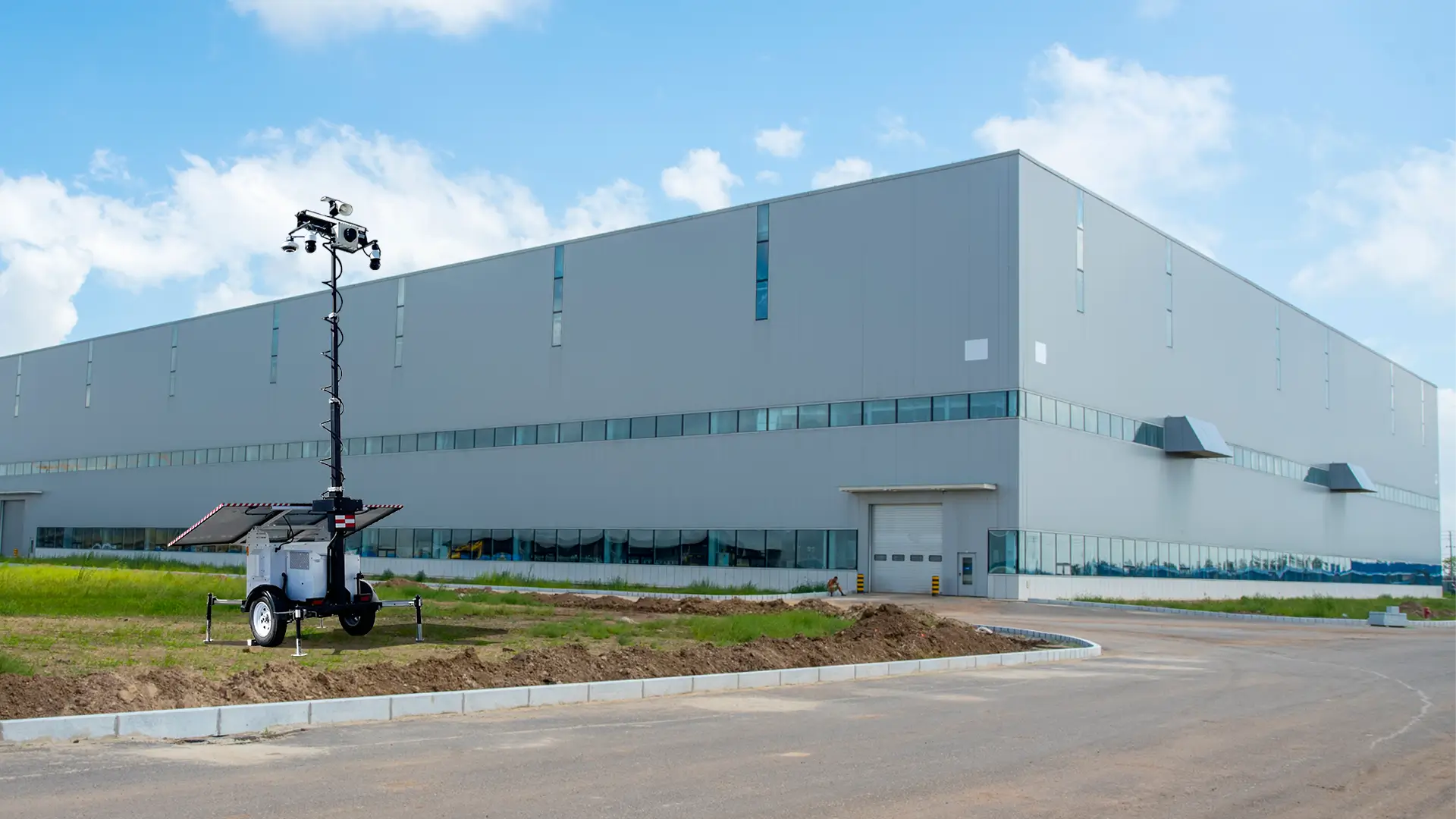Solar-powered security cameras utilize sunlight to provide constant surveillance of their surroundings. While traditional security cameras are useful, their reliance on external power sources can restrict their viability for specific businesses, premises, and locations. As a top alternative to these standard security cameras, solar-powered cameras can be an optimal solution for many businesses’ needs.
Join us in exploring the top five best solar-powered security cameras in 2024 and find out everything you need to know about these cameras to decide if they’re a suitable choice for increasing surveillance and safety across your business’s premises.
What is a Solar-Powered Security Camera?
A solar-powered security camera is a surveillance device equipped with or connected to a solar panel that harnesses sunlight to generate electricity, powering the camera’s operation without the need for traditional electrical wiring or batteries.
Solar cameras are designed to be mounted outside to monitor the surrounding area.
Footage from security cameras can be collected or live-streamed to business owners or security personnel to review and identify any suspicious activities or security incidents.
What Are the Advantages of Solar Cameras?
The top benefits of solar-powered security cameras are:
- Environmentally friendly: Solar-powered cameras operate through renewable solar energy, and choosing them over traditional security cameras can reduce businesses’ carbon footprints.
- Remote locations: Solar security cameras can be installed in remote or even off-grid locations as they do not need to be connected to an electricity source to operate.
- Flexible installation: Businesses can install solar cameras anywhere on their premises and relocate them whenever needed, as opposed to other security solutions that depend on external power sources.
- 24/7 monitoring: As long as solar cameras are exposed to sunlight for several hours a day, they can operate continuously and provide businesses with 24/7 video surveillance, even during power outages.
What Are the Disadvantages of a Solar-Powered Security Camera?
The main drawbacks of solar-powered security cameras include:
- Sunlight dependence: With a reliance on sunlight, solar cameras are unsuitable in locations with frequent cloudy or rainy weather. Extended periods of minimal sunlight may disrupt the camera’s operations.
- High up-front costs: Installing solar-powered cameras can be expensive, particularly if businesses require multiple cameras across large premises.
- Requires maintenance: Security cameras must be cleaned and regularly maintained to ensure their maximum efficiency, which can incur additional long-term expenses.
- Bandwidth issues: Cloud-based solar security cameras need a stable Wi-FI connection to store footage. With internet inferences or weak signals, the cameras may experience disruptions in video streaming and data transmission.
The Top Five Solar-Powered Security Cameras
Keep your business premises in check with the best solar-powered security cameras of 2024:
1. EufyCam 3
With a built-in solar panel, 4K recording capabilities, and intelligent alerts, EufyCam 3 is one of the best solar-powered security cameras available.
EufyCam 3 is easy to set up and use and can record footage in high definition in a variety of different lighting conditions, including during nighttime. Operators can use the Eufy mobile application to view footage, take snapshots, switch on alarms, activate the spotlight, or initiate two-way talk, among other features.
The camera’s field of view is a standard 135º and records footage at 15 frames per second (FPS). Overall, this solar-powered security camera is a top choice for businesses looking for reliable and high-quality footage.
2. Reolink Argus 3 Pro
Reolink Argus 3 Pro is a fantastic all-around solar security camera that records HD footage at 122°, has 16x digital zoom capabilities, is IP65 weatherproof, and can be remotely accessed from anywhere and at any time.
Argus 3 Pro is equipped with two-way audio, smart alerts, motion detection systems, and built-in microSD storage. The attached spotlight allows this camera to continue recording in full color after sundown, allowing for easy identification of events, vehicles, and individuals at all times.
3. Hawkray Solar Powered Security Camera
This solar-powered wireless security camera records in 2K HD resolution and has full-color night vision with built-in infrared light and dual light source white light, allowing the camera to
provide crisp and detailed footage even in low-light conditions.
With AI motion detection and smart alarms, it tracks intruders and detects human body movement from up to 10 meters away. The camera supports pan-tilt control, two-way audio communication, and sound alarms. Its low power consumption enables it to operate at its full capability even after longer periods of minimal sunlight.
4. Blink Outdoor
The 3rd generation Blink Outdoor camera can be mounted with a solar panel to provide constant recording in 1080p. This security camera comes with infrared night vision, two-way audio, motion detection, and cloud/local storage features at a low price, making it a versatile, cost-effective option.
Blink Outdoor is compact, has a notably long battery life, and can be easily installed and connected to the Blink Home Monitor app. Through this feature-rich app, users can configure video quality, trim clips, check the temperature, set motion sensitivity, and create motion zones to fully customize their surveillance experience.
5. Ring Stick Up Cam Solar
The highly durable and versatile Ring Stick Up Cam is ideal for outdoor locations and can reliably record footage while remaining inconspicuous. The camera has a sleek and minimal design, allowing it to blend in with its surroundings.
Ring Stick Up Cam records footage in 720p and has motion-tracking features to detect movement. The solar panel must be purchased as an add-on but can be easily installed to allow the camera to operate on its own despite also being equipped with a rechargeable battery. With optimal cloud storage, this camera allows businesses to store and access recorded footage remotely, providing them with additional convenience and security.
What to Consider When Purchasing a Solar-Powered Security Camera
While certain solar-powered security cameras may be ideal for particular businesses, their usefulness can depend on specific needs and objectives. We recommend considering these factors before making a decision and choosing a solar power security camera:
Price
Some solar-powered security cameras require a single upfront cost, while others are paid for through a subscription-based model. Businesses should consider the camera’s expected lifespan and assess the advantages and drawbacks of each pricing structure to choose the option that best aligns with their budget and needs.
Features
Solar-powered security cameras are equipped with various features that can be highly beneficial in some circumstances but unimportant in others. Common features include night vision, artificial intelligence, two-way communication, motion detection, audio recording, and Pan-Tilt-Zoom (PTZ).
The importance of these features may vary depending on factors such as the camera’s location, the area’s specific security needs, and environmental conditions, so businesses must carefully assess and consider their requirements.
Resolution
All security cameras will have varying resolutions that impact the video footage’s detail and clarity. Higher-resolution cameras provide clear images that allow for the easy identification of objects, individuals, and events.
Cameras will also have different ranges, which impact which businesses they will be most suitable for. For example, long-range cameras have powerful lenses and zoom capabilities that allow them to monitor expansive outdoor areas and capture distant objects. This makes them most suitable for large premises such as industrial sites and agriculture facilities.
Storage
Security cameras have two main storage options: cloud and local. Local storage is in the form of a MircoSD card or a similar storage device inserted directly into the camera to store all footage. Storage devices can typically store between 128GB and 512GB, which is equal to up to hundreds of hours of video, depending on the footage’s resolution. Local storage is reliable but has a risk of being damaged or stolen.
Cloud storage is sent to a remote server, where it is stored, and it usually requires a monthly fee. Cloud storage’s main advantage is ensuring footage is secured in a remote location to reduce the risk of data being lost due to theft or damage to the camera. However, the ongoing cost of cloud storage can incur considerable expenses, and this option relies on a stable internet connection.
Durability
Since solar cameras will operate outside, they must be resistant to various weather conditions, such as rain, high temperatures, strong winds, and sun exposure. An optimal solar security camera will also be resistant to moisture and humidity to prevent it from being damaged by rust or corrosion.
If your security camera is installed in a public area, it may be vulnerable to vandalism and tampering. Therefore, it should be designed with durable materials and additional security features such as tamper-proof screws, locking mechanisms, and backup power sources.
Safeguard Your Property With American Security Force’s Professional Monitoring
Overall, solar-powered cameras can be a great addition to a business’s security strategy. If you want to monitor your premises 24/7 while reducing your carbon footprint, a solar-powered camera can be your best option.
At American Security Force, we can craft an optimal security strategy on your behalf, including choosing, installing, and monitoring solar-powered security cameras. By monitoring recorded footage, we can identify and quickly address any security incidents to ensure your business premises are kept safe, even when you’re not on location.
Contact us today to take your first steps toward solar-powered security!
FAQs
Find out more about solar security cameras with these answers to common questions:
Are solar-powered security cameras any good?
Yes, solar-powered security cameras have a variety of advantages and are a viable security solution for many businesses, particularly those that conduct the majority of their operations outside.
Do solar-powered cameras need internet?
Depending on the model and manufacturer, solar-powered cameras may not need an internet connection to operate. However, cameras that transmit footage over a cloud-based application require a stable connection to upload recorded videos or provide remote access to live footage.
Do solar-powered cameras work at night?
Yes! Solar-powered cameras can generate and store electricity during the daytime, enabling them to operate at nighttime or during cloudy days, giving businesses 24/7 surveillance of their premises.




